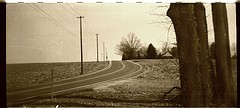Anytime I’ve tackled something new or different, whether a new assignment at work or a new online project, I go through a period I can only describe as a state of confusion. What do I need to know? Where can I get the information? At some point, I may even feel completely inadequate. In business and education, they describe this period as a “learning curve”. I would disagree that it’s a curve at all.
A curve implies that we learn progressively in a nice, smooth sequence, with more to learn as we get deeper into the effort and less to learn as we reach the other end of the curve. Maybe mathematically this makes sense, but emotionally, at the roundest part of the curve where we have the most to learn, it sometimes feels like walking barefoot on a jagged edge. We’re lucky if we feel we’re treading water, but often it feels as if we’re slipping backwards.
I have over 20 years of management experience. I’ve handled projects with millions of dollars at stake. It doesn’t matter how much experience I have or how much I know about my industry, each new project brings the same cycle. Even smaller personal projects – Squidoo, my own blog, building my family tree online – follow a similar pattern.
We get the nut of the project or idea. We dive in and gather all the facts. Feeling sufficiently prepared, we make a plan and move forward. Unless you have the Midas touch – which I don’t – somewhere between the first step of moving forward and completion of the project, we’ll come across something relatively important that we didn’t know. We regroup and move forward again. The cycle of uncovering new information that sets us back may recur numerous times for various reasons. These periods cause us frustration, even stress. It’s in these stages we question our own intelligence. Why didn’t I check that first? Why didn’t I see that one piece of information that was sitting right under my nose? Am I the only person who didn’t know that? We fill our heads with negatives and there’s nothing smooth about them.
If you really think about it, though, these are the times when we learn the most. If we hadn’t tripped, we’d have missed an opportunity to inspect the reason for the mistake sufficiently to squeeze all the knowledge possible from that event. These are the periods that open our eyes to new opportunities and new ways of being successful. They firm up our ability to be critically strategic in future initiatives because had we not learned these lessons so significantly, we might not have learned them at all.
Harry S. Truman said it best:
“It’s what you learn after you know it all that counts.”


1 comment for “A Learning Curve or a Jagged Line?”